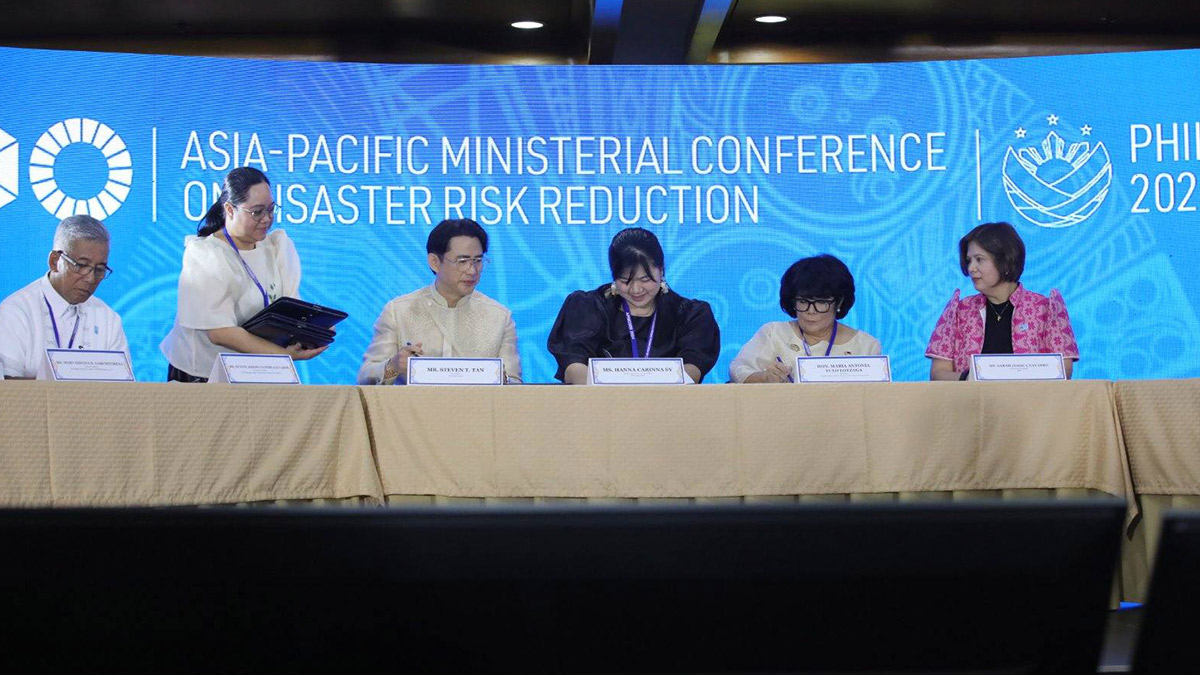
PROTECTING ENDANGERED SPECIES. Environment Secretary Maria Antonia Yulo-Loyzaga (2nd from right) and representatives from the private sector sign a memorandum of agreement for the “Save from Extinction Campaign” during the Asia Pacific Ministerial Conference on Disaster Risk Reduction (APMCDRR) at the Philippine International Conventions Center on Tuesday (Oct. 15, 2024). The pact provides for a partnership in protecting six endangered species in the country. (PNA photo by Avito Dalan)
MANILA, Philippines – The Department of Environment and Natural Resources (DENR) on Tuesday forged a partnership with the private sector and leading non-government organizations (NGOs) on the conservation of several species in the Philippines that are facing extinction.
Environment Secretary Maria Antonia Yulo-Loyzaga signed a memorandum of agreement (MOA) for the “Save from Extinction Campaign” at the Philippine International Convention Center (PICC) during the Asia Pacific Ministerial Conference on Disaster Risk Reduction (APMCDRR) in Pasay City, as part of the Philippines’ efforts to save six endangered species, including the pangolin, Philippine eagle, dugong, pawikan, Philippine cockatoo, and the tamaraw.
Other signatories to the MOA are representatives from SM Prime and the BDO Unibank, World Wide Fund (WWF) Philippines, Philippine Eagle Foundation, Katala Foundation, Forest Foundation Philippines, Zoological Society of London, and D’Aboville Foundation.
“Today, we formalize our joint commitments with our lead conservation partners and the private sector for the protection of six key species whose habitats are life support systems, not just for the species themselves, but the communities that depend on the valuable ecosystem services that these habitats provide,” Loyzaga said.
The DENR chief said the pact provides for integrated work programs and sharing of resources between the agency and partner organizations for the measure.
She cited that the SM Group, including BDO Unibank, will allow the use of its banking and retail platforms to raise funds for the conservation of these species.
At the same time, the Forest Foundation Philippines will represent the first and only debt-for-nature arrangement between the United States and the Philippines.
Under a debt-for-nature arrangement, a country that has received development finance can cancel its debt if it agrees to earmark the funds it would have paid for debt servicing for financing programs that protect biodiversity.
“For the Philippine Eagle, which depends on our highland forests, we have the Philippine Eagle Foundation. For the dugong, our endangered sea mammal, and our marine turtles who subsist on seagrass fields that are so valuable to ocean health, the maintenance of the food and nutrient web, and carbon sequestration as well, we have the World Wildlife Fund for Nature,” she said.
“For the tamaraw, which lives in our mountain areas, we have the Zoological Society of London and D’Aboville Foundation, who will be addressing the needs of also the highly trafficked pangolins. For the Palawan Kakatu, who shares the habitat of the pangolin, we have the Katala Foundation,” she added.
Loyzaga said environmental degradation due to overexploitation, pollution, wildlife trafficking, and land use change have caused biodiversity loss.
It also caused declines in ecosystem services that support water, food, and energy security, as well as functions such as flood control, soil management, erosion control for landslide prevention, and carbon sequestration for mitigation.
The Philippines is among the world’s megadiverse countries with over 52,000 species, of which around half are endemic, and around 2,000 species of flora and fauna ranging from vulnerable to endangered.
“Our experience has been that habitat loss through human action and extreme weather events can alter these habitats and act as tipping points towards the loss of ecosystem function and these species that are part of the life support system of all of our cities and communities,” Loyzaga said.
Protecting these species, Loyzaga said, also has co-benefits, not only for mitigation and adaptation but for disaster risk reduction as well.
However, due to the limited fiscal space and competing priorities, she said the government cannot do it alone.
Meanwhile, SM Supermalls president Steven Tan expressed hope that the partnership will benefit the future generation as well, who will be the future stewards of the earth.
“Together, we hope this network will grow in order to generate co-benefits we so badly need for adaptation, mitigation, and disaster risk reduction, the protection and increase of our species, and the protection of their habitats, thereby creating opportunities for nature-based solutions and potential green,” he said.